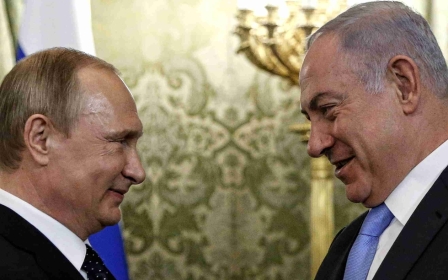This bombast from Trumpland was a gift to the Iranian government

In the latest installment of “Trump Tells the World He’s Going to Kill the Iran Nuclear Deal,” UN Ambassador Nikki Haley was dispatched this week to Washington’s neoconservative beehive – the American Enterprise Institute – to wag the dog.
It was hard to keep up with all the little fibs and deceptions that she weaved into her remarks with such speed and tenacity. They were ridiculed across the world in real time on social media and, subsequently, by the commentariat.Equally important but less understood, however, is the gift that Haley served to Iran’s government on a silver platter. Two key points illustrate why her speech left Iranian officials smiling.
Reinforcing unity
First, Haley’s bluster has reinforced the strategic decision made by Supreme Leader Ali Khamenei and President Hassan Rouhani four years ago: maintain unity on policy towards America, regardless of whether there is a nuclear deal or not.
The foundation of this decision was predicated on avoiding the diplomatic and financial isolation that plagued Iran from 2005-13 – which in turn eroded government legitimacy in the eyes of many Iranians, thereby widening the gulf between Iran’s state and society, and destabilising the former.
The hostile deceit from Haley simply incentivises Iran’s disparate political factions to further strengthen ties around the shared goal of resisting American aggression
Like any politicians, the two men have their political differences, but this does not change the baseline: Khamenei needs Rouhani to continue digging Iran out of the political and economic hole shovelled by Ahmadinejad. And Rouhani needs Khamenei to protect him from hardline political sniping as he tries to put Humpty Dumpty - the government's legitimacy - back together again.
Now the hostile deceit from Haley and her fellow Trump administration foreign policy hawks is incentivising Iran’s disparate political factions to further strengthen ties around the shared goal of resisting and surviving American aggression.
By contrast, the aftermath of the nuclear negotiations forced the same Iranian stakeholders to grapple with countless internal divisions – from economic policy, to press freedoms, to ending the house arrest of Green Movement leaders Mir Hossein Mousavi and Mehdi Karroubi – that returned to the forefront when hostility from Washington was not a potent unifying force.
Shifting blame
Second, Haley’s screed is yet another example of bombast from Trumpland that Iranian officials can use to deflect domestic political pressure by shifting the onus of US-Iran conflict onto Washington. To that end, the growing unity amongst political elites on the issue of American aggression is also matched by increasing cohesion between state and society.
Each sentence uttered by Haley at the podium helped deflect responsibility onto America in the eyes of Iranian society
Today, Rouhani and Khamenei continue to utilise the domestic narrative they constructed when negotiations with Washington began in 2013, based on three interconnected premises:
1) We are exhausting all options in pursuing peaceful solutions that protect your rights, interests and dignity;
2) Thus, it is America that bears responsibility for any remaining conflict, so do not blame us for sanctions;
3) And since America is killing the nuclear deal despite our compromises and compliance, the onus is on them to cease hostility, resume constructive dialogue, and resolve this unnecessary standoff.
Each sentence uttered by Haley at the podium helped deflect responsibility onto America in the eyes of Iranian society. If Washington kills the deal, Iranians will not blame their leaders because they can correctly accuse the Trump administration for reigniting a nuclear conflict that was resolved two years ago.
I served at the US Department of State during the George W Bush administration, and one of the marching orders we received from the White House was to promote fissures within the Iranian government to weaken it, isolate it, and – over time – help it crumble. Republicans demonstrably failed then, and they will fail now.
Haley’s speech was only the latest in a long line of own goals that empower the very government this administration is trying to pick a fight with. Iran would prefer to keep the nuclear deal alive and reduce tensions with the United States.
America killing the deal will likely reduce nuclear, financial and geopolitical constraints on Iran at little cost to its political elite. If Trump’s team wants to allow Tehran to have its cake and eat it too, Iranian officials will gladly oblige.
- Reza Marashi joined NIAC in 2010 as the organisation’s first research director. He came to NIAC after serving in the Office of Iranian Affairs at the US Department of State. Prior to his tenure at the State Department, he was an analyst at the Institute for National Strategic Studies (INSS) covering China-Middle East issues, and a Tehran-based private strategic consultant on Iranian political and economic risk. Marashi is frequently consulted by Western governments on Iran-related matters. His articles have appeared in The New York Times, Foreign Affairs, Foreign Policy, and The Atlantic, among other publications. He has been a guest contributor to CNN, NPR, the BBC, TIME Magazine, The Washington Post, and the Financial Times, among other broadcast outlets. Follow Reza on Twitter: @rezamarashi
The views expressed in this article belong to the author and do not necessarily reflect the editorial policy of Middle East Eye.
Photo: US Ambassador to the UN Nikki Haley speaks during a UN Security Council emergency meeting in September 2017 (AFP)
Middle East Eye propose une couverture et une analyse indépendantes et incomparables du Moyen-Orient, de l’Afrique du Nord et d’autres régions du monde. Pour en savoir plus sur la reprise de ce contenu et les frais qui s’appliquent, veuillez remplir ce formulaire [en anglais]. Pour en savoir plus sur MEE, cliquez ici [en anglais].







